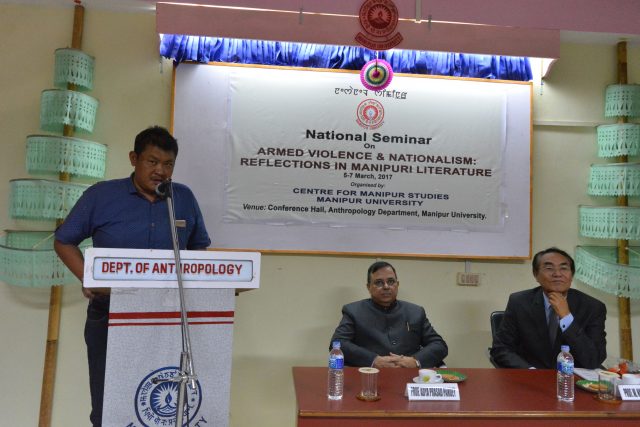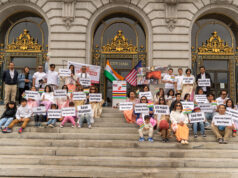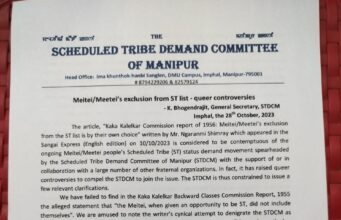5th February 2017, Imphal : Manipur, an erstwhile sovereign Asiatic powerful kingdom, became an integral part of India since 15 October 1949 with the signing of Merger Agreement of Manipur to India. Despite no immediate response to the Merger, the ‘Central Government’s colonial attitude towards Manipur during the long central rule (1949-1971) was the major cause of the political turmoil, economic backwardness and social tension. Since then, Manipur had experienced sustained movement for higher political status. In the 1960s, Manipur had also witnessed insurgent armed violence resulting out of conflict between non-state and state actors with the sprouting of self-determination movements. Manipur, then, was granted statehood on 21 January 1972. By then, insurgency started gaining ground and the cycle of violence that followed led to the rampant human rights violation and the abuses. Against the contemporary turmoil in Manipur where armed violence resulting out of insurgency had resulted to serious contemporary social turmoil, a seminar on ‘Armed Violence and Nationalism: Reflections in Manipuri Literature’ organized with the objective to capture the insurgency engendered issues of the resistance and dissent, nostalgia for the glorious past, the present day turmoil, the hope for better future and harmonious inter/intra community relations as documented and portrayed in Manipuri literature in the forms of novels, poems and plays . Against this backdrop, the seminar titled ‘Armed Violence and Nationalism: Reflections in Manipuri Literature’ organized by the Centre for Manipur Studies, Manipur University (MU) with the intention to capture the glimpse of the present day social turmoil through the eyes of the creative writers and litterateur was inaugurated today by the Hon’ble vice chancellor of MU, prof. Arya Prasad Pande at the Conference Hall of Anthropology Department University. The Keynoe Adress was delivered by, Prof. W. Nabakumar of Anthropology Dept., MU. In the keynote, Prof. Nabakumar articulated that anti-colonial nationalism is the product of de-colonizing forces. The meaning of nationalism in Asia and Africa is found to be quite different from those propagated and practiced by the western countries. Instead of ‘third world countries’, he preferred to use ‘Asia and Africa’ reasoning that there is an ethical bias in the term ‘third world. Saying so, he also pondered whether it is possible to reconcile the often particularism of Asia and Africa in the light of Globalisation. He also stated that armed conflict is a symptom of political illegitimacy, He also stated that the question of whether armed conflict is legitimate or illegitimate nationalism is reflected in the literature. In the context of India, he reflected whether Indian nationalism can accommodate all the diversities and heterogeneous communities. Mentioning JP Narayan, the towering post independent political leader, and the distinction he made between the people who comprise the state and the nation, he says the former has heterogeneous interest and the later centralized interest. Making a distinction of the typology of nationalism, he also queried whether armed conflict in Manipur is a manifestation of good nationalism or bad nationalism. One man’s patriot could be others’ criminal, he stated mentioning the differing perspective of the core and the periphery. He elucidated it by citing the example of Bhagat Singh and Khudiram being hailed as patriot from the Indian perspective and being branded criminal from the perspective of the British colonisers. While historical justifications have been given to legitimise the armed conflict, it can be contemplated upon whether the engendering factor of armed movement in the state is germinated from the soil of the land or foreign and derivative discourse. At the end, he expressed the hope that learned delegate will discuss all these as it is reflected in Manipuri Literature. Prof. Arya Prasad Pande, the VC of Manipur University, speaking on the occasion, stated that Manipuri literature had a tradition of writing on themes of nationalism which is evident even during the days of British colonialism, and that despite the differences in the cultural practices and physical attributes of the people in the state with those in heartland of India, Manipuri literature is a part of the great Indian mind.
In the two-day long proceedings which will start from tomorrow, the 6th March, 2017, it will open with four invited speakers giving their respective interactive lecture to be moderated by Prof. N. Joykumar, Former Director. Centre for Manipur Studies, Manipur University. The invited speakers are- MoirangthemPriyobarta (Eminent Literary Critic); DilipMayengbam (Former Director, Jawaharlal Nehru Manipur Dance Academy); Khetri Prem (assistant Professor, English Dept., Tripura University).
In the first day, on 6th March 2017, the Technical Session I, scheduled to start from 12 Noon to be moderated by Th. Ibohalbi will altogether have six papers presented by the respective contributors. They are – Emerging Manifestations of conflict situations and its reflections in Manipuri literature by H Ibotombi Khuman; Armed Violence and Nationalism: Reflections in Manipuri Poetry by Konthoujam Ranjita Devi, Chengni Khujai da Insurgency Kumbaba (tr., Documenting Insurgency as Manifested in Chengni Khujai) by K. Shantibala; Ayeebisingi Warimachada Lalhoubagi Masak: 2000-2010 (tr., Potrayal of Insurgency in the Short Story of Women Creative Writers: 2000-2010 ) by Maya Nepra; Manipuri Warimachada Lalhoubagi Samashya (tr., Insurgent Unrest in Manipuri Short Stories) by A. Indira Devi; Keisam Priyokumar gi Warimachada Khutlai Paibagi Irang (tr., Armed Unrest in the Short Stories of Keisham Priyokumar) by Hemom Shilla Devi. It will be followed by a Lunch. In the Technical Session II (Post Lunch) scheduled to start from 2.00 pm, to be moderated by Prof. P. Nabachandra, Former Dean of School of Humanities, Manipur University will altogether have seven contributors presenting their respective papers. They are: E.S. Sundar gi Upanyasta Lalhaubagi Mami (tr., Reflections of Insurgency in the Novels of E. Sundar) by Th. Geetarani; Sorarengi Machanupi and Kangla Diary: Issues of Insurgency Reflected in the Novels of B.M. Maisnamba by Sarangthem Sobharani Devi Selectivity of language in the State discourse on Manipur’s insurgency by HanjabamShukhadeba Sharma; Nongthongbam Kunjamohon amasung Laitonjam Premchandgi Warimachada Lalhoubagi Irang (tr., Insurgent Unrest in the Short stories of Nongthongbam Kunjamohhon and Laitonjam Premchand) by S. Premila Devi; Keisam Priyokumar gi Warimachada Lalhaubagi Samashya (tr., Problems of Insurgency in the Short Stories of Keisham Priyokumar) by Thingnam Joyshree Devi; Armed Violence: Reflection in Jodhachandra’s Novel by Th Tarun Kumar; Deepti Priya Mehrotra’s Burning Bright: A Study of the Armed Violence and Women’s Response by Moirangthem Linthoingambi.
In the second day, on 7th March 2017, the Technical Session III A, at Conference Hall of the Anthropology DEpt., MU, will be moderated by Prof. N. Tombi of Manipuri Dept, MU. The papers and their respective contributors are: Troubled Homeland: ‘Angst for homeland’ in Tattooed with Taboos by Ph Jayalaxmi; Of Male Aggression and Surppressed voices: Poetics of violence in the poetries of Manipuri women poets by Lingthoingambi Thangjam; Literary Aesthetics’ Presenting of political violene: the intrinsic-extrinsic dialogue of the significant form by P Milan Khagamcha; Romance of Insurgency in Manipur in the 1970s and 1980s by K Ruhini Kumar and AmalSanasam; Manipuri Seirengda Armed Violence amasung Nationalism gi Ihou. (tr., Resurgent Armed Violence and Nationalism in Manipuri Poetry) by W. Kumari Chanu; Mareibak Ningba amadi Ningtambagi Ihouda Irabot: Maruoina Magi Seireng ‘Imagi Puja’ amadi ‘Iseida Neinaba’ (tr., Nationalism and Movement for Freedom in Irabot’s Poetry: With Special Reference to ‘Imagi Puja’ and ‘Iseida Neinaba’ by Imagi Puja by M. Nirmala Devi
Simultaneously, there will be another parallel Technical Session III B, at the Ground Floor Seminar Hall of the Anthropology Dept., to be moderated by Prof. S Mani Singh of Political Science, Manipur University. The papers along with the respective resource persons are: Plight of truck drivers at NH 37 during economic blockade in Manipur: a grave concern of human security by I Yaipharemba; Insurgency movement in Manipur: signing of suspension of operation (SoO) with some insurgency groups by government by A S Kingson; Floating RTE in Loktak Wetland: Resurging education in an evicted zone by Mumta Lukram, Pari Imom Samu Pangalba: then, now and forevoer in times of hopes and despairs by BhabanandaTakhellambam; Asserting Geo-body of Nagalim by Mangoljao Maibam, Society in the time of insurgency: Guerrilla polemics and the projection of victimhood by MalemNingthouja;
The Technical Session IV (Post Lunch) on 7th March 2017,will start at 2.oo pm at Conference H Khundongbam Brojendrogi Dramada Lalhoubagi Samashya (tr., Issues of Insurgency in the Dramas Of Khungdongbam Premchand) by L. Sangita; Khundongbam Brojendrogi Dramada Lalhoubagi Samashya (tr., Issues of Insurgency in the Dramas Of Khungdongbam Premchand) by L. Sangita; Representation of Victims of Armed Conflict in Lancha’sMami Sami by Homen Thangjam; Jodhachandra Sanasam amadi Khetri Bira gi Upanyasta Lalhaubagi Mami (tr., Reflections of Insurgency in the Novels of Jodhachandra Sanasam and Khetri Bira) by Bishnulatpam Emerging Insurgency in Manipur as reflected in Ayekpam Tomuchou’s Chagi Khuji by AheibamKoireng Singh.
In the valedictory function scheduled to start from 3.30 am, Prof. N. Aruna will deliver the Valedictory Speech followed by the awarding of certificate and formally declaring the function, ‘closed’.












